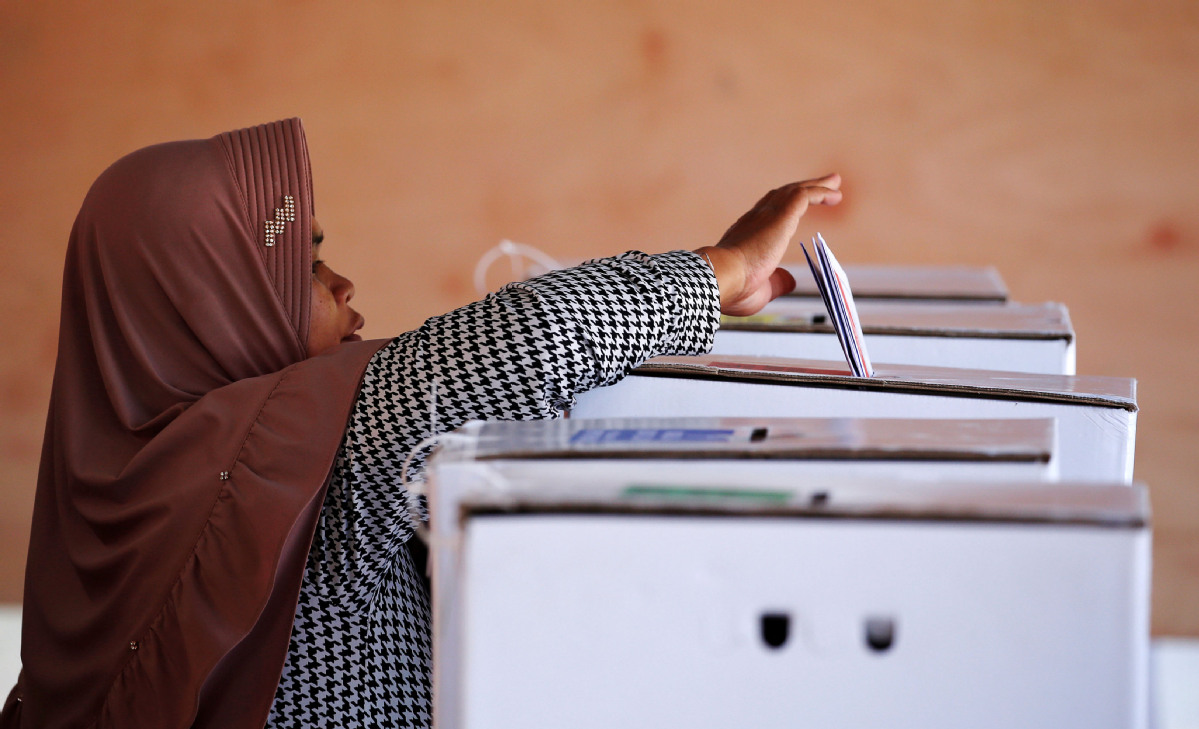Unofficial results show Widodo leading in Indonesian presidential vote
By YANG HAN | China Daily | Updated: 2019-04-17 08:57

Unofficial results show incumbent President Joko Widodo leading race
One top job post in Indonesia, around 20,300 parliamentary and other seats, and roughly 190 million voters.
In just one day since the first group of polling stations opened on Wednesday in the east and the last one closed in the west, the most populous Muslim nation in the world undertook one of the largest polls and completed the first elections for the president and parliament members held on the same day.
These are against all logistic odds, thanks to more than 800,000 polling stations on thousands of vastly dispersed islands.
The peak of months of drama feature incumbent President Joko Widodo against former general Prabowo Subianto.
President Widodo, popularly known as Jokowi, dressed in a white shirt and accompanied by First Lady Iriana Widodo, voted in the capital.
"I feel relieved," Widodo told the media after casting his ballot and displaying a finger dipped in indelible ink, part of the process of avoiding fraudulent voting.
Asked if he was feeling optimistic about the results of Wednesday's poll, Widodo said: "Always. We should stay optimistic at work."
Separately, Prabowo, after voting in Bogor, echoed his campaign themes of a weak Indonesia at risk of disintegration.
"I promised that we will work for the good of the country," he said.
More than 245,000 candidates supported by 16 national political parties and four local parties are competing for more than 20,000 seats in the country.
Unofficial "quick counts" were released after 3 pm local time on Wednesday. The counts are conducted by certified pollsters and have proved accurate in the past. As of 3:30 pm, the early unofficial count showed Jokowi to be in the lead.
The official initial count is expected to be released a week after the vote.
The election will showcase how democracy works in Indonesia, the biggest Muslim country in the world, said Siwage Dharma Negara, senior fellow at the ISEAS-Yusof Ishak Institute, or ISEAS, a research facility in Singapore.
"It also shows whether Indonesia can balance and achieve both goals-maintaining its democratic principle and also progressing in terms of its economic development at the same time," said Negara, who is also a coordinator of the Indonesia Studies Programme at ISEAS.
"Indonesia is one of the very few countries in Southeast Asia that has been consistently democratic over the last 20 years and it is the largest country in the region, so the prospects for democracy in Southeast Asia are closely tied to the fate of Indonesia's democracy," said Diego Fossati, assistant professor of Asian and International Studies at the City University of Hong Kong, or CityU.
The Indonesian General Elections Commission, or KPU, has listed more than 192 million eligible voters in the 2019 election, of which about 40 percent are millennials. More than 2 million overseas voters had earlier cast their votes over the weekend.
Nanik Sri Hartini, a 41-year-old domestic helper in Hong Kong, cast her ballot at the polling station in Wanchai last Sunday. It was the first time she had voted from the city.
"Whoever wins the election, I just hope we can have a president that will improve the economic development of Indonesia and the living quality of its people," Hartini told China Daily.
In response to the recent discovery of marked ballots before Indonesian voters had cast their ballots in Malaysia, which led to allegations of vote-rigging, KPU has announced that a revote will be scheduled in Kuala Lumpur, The Jakarta Post reported on Wednesday.
If Jokowi remains as the president, ISEAS' Negara expects there will be more continuity than changes in terms of the country's economic, social and foreign policies. On the other hand, there will be more changes if Prabowo wins the election, including measures he has promised in the campaign such as reducing the electricity tariff.
Fossati with CityU said the link between rhetoric and policy in Indonesia is weak. For example, Jokowi was considered to be a radical reformer and champion of pluralism in the 2014 campaign, but he governed as a centrist.
The relations between China and Indonesia will continue to grow regardless of who the president will be, said Negara, noting China is the biggest trade partner and the third-largest foreign investor for Indonesia.
"I don't see that any president will refuse to cooperate with China," said Negara, referring to the China-led Belt and Road Initiative. "As long as the benefit can be felt by the local people, I think Indonesia will be supportive to further economic cooperation with China."
The official result is expected to be announced by the General Election Commission by May 22.
























